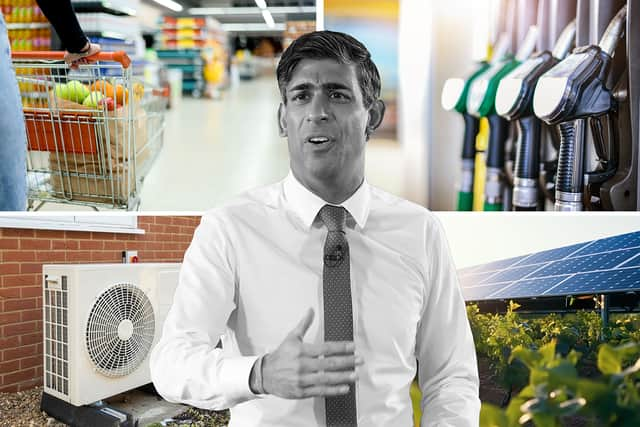Net Zero: Rishi Sunak's climate policy rowbacks will cost drivers and renters more money - top advisers say
and live on Freeview channel 276
Rishi Sunak's climate policy u-turns may have been a bid to save British families from "unacceptable costs", but government advisers have revealed they will likely cost drivers and renters more money.
In recent months, the government has announced a series of rowbacks on climate and nature policies. Prime Minister Rishi Sunak last month announced delays to the banning of new petrol and diesel vehicles - originally set for 2030 - would be pushed back five years, while only 80% of gas boilers would need to be phased out by 2035 rather than all of them.
Advertisement
Hide AdAdvertisement
Hide AdPlans to make landlords improve the energy efficiency of their rentals were also scrapped, while in August, Sunak revealed he planned to grant at least 100 new oil and gas exploration licences in the North Sea. The government has also delayed Biodiversity Net Gain, a policy which will require building developers to improve wildlife habitats, until next January - on the back of a devastating report revealing one in six UK species is faced with extinction.
But now analysis by the Climate Change Commission (CCC), the government's expert climate adviser, has revealed the Prime Minister’s delays to decarbonising buildings and transport will make net zero harder to achieve - while adding more costs onto ordinary people. Renters will have to pay higher energy bills in less-efficient homes, it warned, while drivers who switch to electric cars later rather than sooner will face higher costs across the vehicle’s lifetime.


Scrapping plans to require landlords to make their properties more energy efficient means a typical household could lose out on as much as £325 a year under current energy prices, according to the CCC’s analysis.
On 20% of households being exempt from phasing out gas boilers, the CCC said it was unclear which households would be eligible for exemption - and while the grants to replace boilers rose from £5,000 to £7,500, the overall budget had not changed - meaning it would be available to fewer houses. It would also leave “residual emissions” bleeding across the net zero by 2050 target.
Advertisement
Hide AdAdvertisement
Hide AdThe CCC did welcome some of the government’s changes, such as a deal to electrify the Tata Steel plant in Port Talbot and the Zero Emissions Vehicle mandate, which should see 80% of new cars sold with zero emissions by 2030. The ZEV might even offset Sunak’s delay ending the sale of fossil fuel cars, it found, although the change could weaken confidence in the electric vehicle industry from both businesses and buyers.
It would also load more costs onto drivers in the long term, as it is cheaper to run an electric vehicle over the car’s lifetime, the committee added. CCC chair professor Piers Forster told PA: “We remain concerned about the likelihood of achieving the UK’s future targets, especially the substantial policy gap to the UK’s 2030 goal.
“Around a fifth of the required emissions reductions to 2030 are covered by plans that we assess as insufficient," he continued. “Recent policy announcements were not accompanied by estimates of their effect on future emissions, nor evidence to back the government’s assurance that the UK’s targets will still be met. We urge the Government to adopt greater transparency in updating its analysis at the time of major announcements.”
A government spokesperson told PA: “The UK remains a global leader on climate – cutting emissions faster than any other G7 country – so we are confident that we will meet our future carbon commitments, including net zero, just as we have over-delivered on every carbon target to date.
Advertisement
Hide AdAdvertisement
Hide Ad“We are taking a fairer and more pragmatic approach to meeting net zero that eases burdens on families – saving households up to £15,000 on upfront costs to upgrade their homes," they said. “We will continue to meet our international commitments under the Paris Agreement, while embracing the opportunities of clean industries – supporting thousands of British jobs, driving economic growth – while protecting national security and bringing down energy bills in the long term.”
Danny Gross, climate campaigner at Friends of the Earth, said the assessment highlighted the "glaring inconsistencies" between the government’s rhetoric and action. "Rishi Sunak has said he will honour his commitment, made at the COP27 climate talks in Egypt, to cut the UK’s carbon emissions by over two-thirds by 2030. His climate advisors are telling him loud and clear that his plans just don’t add up and the target will be missed.
“Instead, the Prime Minister is scrapping policies that would reduce harmful emissions and cut sky-high energy bills," he continued. "A government of integrity, wouldn’t be trying to pull the wool over people’s eyes by pretending it can deliver on promises with a climate plan that’s just not up to scratch.”
Greenpeace UK's head of climate Mel Evans added: "We are never going to reach our climate targets by rowing back the policies to get us there, and this damning indictment from the Climate Change Committee shows us just how much Sunak’s rollback will cost ordinary people.
Advertisement
Hide AdAdvertisement
Hide Ad“Cutting plans for home insulation and continuing our dependence on gas boilers will only ensure household bills remain at the mercy of volatile fossil fuel prices, whilst making sure big corporations and the oil and gas lobby win big," she said. Boosting renewables, prioritising insulation and giving clear, consistent policy signals on electric vehicles would help families across the country, Ms Evans continued.
"But instead Sunak has chosen to play politics with the climate, sow division, and distract people from the real problems the country faces.”
Comment Guidelines
National World encourages reader discussion on our stories. User feedback, insights and back-and-forth exchanges add a rich layer of context to reporting. Please review our Community Guidelines before commenting.
